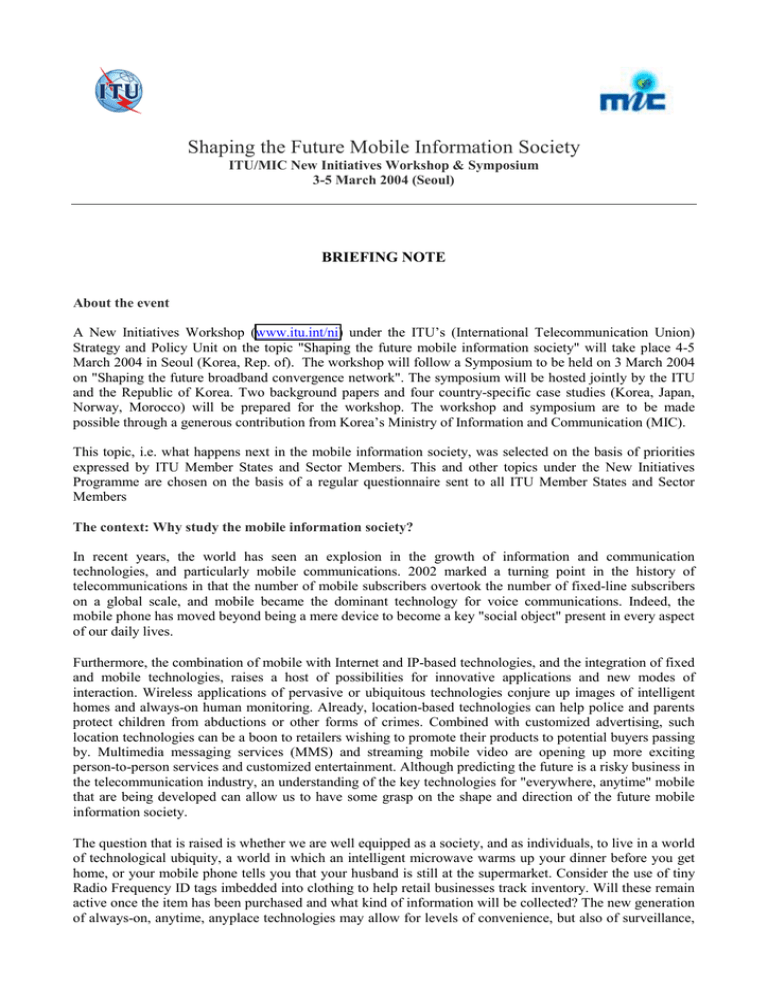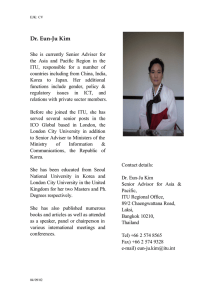Shaping the Future Mobile Information Society BRIEFING NOTE
advertisement

Shaping the Future Mobile Information Society ITU/MIC New Initiatives Workshop & Symposium 3-5 March 2004 (Seoul) BRIEFING NOTE About the event A New Initiatives Workshop (www.itu.int/ni) under the ITU’s (International Telecommunication Union) Strategy and Policy Unit on the topic "Shaping the future mobile information society" will take place 4-5 March 2004 in Seoul (Korea, Rep. of). The workshop will follow a Symposium to be held on 3 March 2004 on "Shaping the future broadband convergence network". The symposium will be hosted jointly by the ITU and the Republic of Korea. Two background papers and four country-specific case studies (Korea, Japan, Norway, Morocco) will be prepared for the workshop. The workshop and symposium are to be made possible through a generous contribution from Korea’s Ministry of Information and Communication (MIC). This topic, i.e. what happens next in the mobile information society, was selected on the basis of priorities expressed by ITU Member States and Sector Members. This and other topics under the New Initiatives Programme are chosen on the basis of a regular questionnaire sent to all ITU Member States and Sector Members The context: Why study the mobile information society? In recent years, the world has seen an explosion in the growth of information and communication technologies, and particularly mobile communications. 2002 marked a turning point in the history of telecommunications in that the number of mobile subscribers overtook the number of fixed-line subscribers on a global scale, and mobile became the dominant technology for voice communications. Indeed, the mobile phone has moved beyond being a mere device to become a key "social object" present in every aspect of our daily lives. Furthermore, the combination of mobile with Internet and IP-based technologies, and the integration of fixed and mobile technologies, raises a host of possibilities for innovative applications and new modes of interaction. Wireless applications of pervasive or ubiquitous technologies conjure up images of intelligent homes and always-on human monitoring. Already, location-based technologies can help police and parents protect children from abductions or other forms of crimes. Combined with customized advertising, such location technologies can be a boon to retailers wishing to promote their products to potential buyers passing by. Multimedia messaging services (MMS) and streaming mobile video are opening up more exciting person-to-person services and customized entertainment. Although predicting the future is a risky business in the telecommunication industry, an understanding of the key technologies for "everywhere, anytime" mobile that are being developed can allow us to have some grasp on the shape and direction of the future mobile information society. The question that is raised is whether we are well equipped as a society, and as individuals, to live in a world of technological ubiquity, a world in which an intelligent microwave warms up your dinner before you get home, or your mobile phone tells you that your husband is still at the supermarket. Consider the use of tiny Radio Frequency ID tags imbedded into clothing to help retail businesses track inventory. Will these remain active once the item has been purchased and what kind of information will be collected? The new generation of always-on, anytime, anyplace technologies may allow for levels of convenience, but also of surveillance, unknown and unimagined by earlier generations. At the dawn of this new age, it is important to consider what effect these technologies are having on the way we grow, interact, socialize and learn. Workshop objectives The objective of the workshop is to serve as an international forum for ICT policy-makers, regulators, user groups, industry and other experts (such as futurologists) to exchange their visions of the future mobile information society. National initiatives and frameworks will most certainly vary depending on income, geography and demographics. The workshop will seek to identify a number of important global trends in mobile service and application development, and attempt to glean a glimpse of the future mobile landscape. Discussions will revolve around market drivers and inhibitors, implications for public policy and social considerations. The experiences of individual countries will help stimulate the debate. At the conclusion of the meeting, workshop participants will attempt to distil a set of policy priorities for the future mobile information society, and posit on the role of international cooperation in ensuring a healthy and safe mobile future. Agenda Sessions at the workshop will include the following topics: • • • • • • • Implications of Broadband convergence networks The relevance of local and cultural factors in service design Market Drivers and Inhibitors Mobile at heart – opportunities and threats for the youth market Priorities for regulation and public policy in the mobile information society Riding the mobile wave in the developing world International cooperation in the future mobile information society Participation at the workshop will be limited to 40-60 experts. The content of the symposium “Shaping the broadband convergence network” will be more technical in nature, and include presentations on network architecture and convergence. The symposium will be open to the wider public – over 200 participants are expected. An ITU background resources website has been developed on the subject at www.itu.int/futuremobile.

